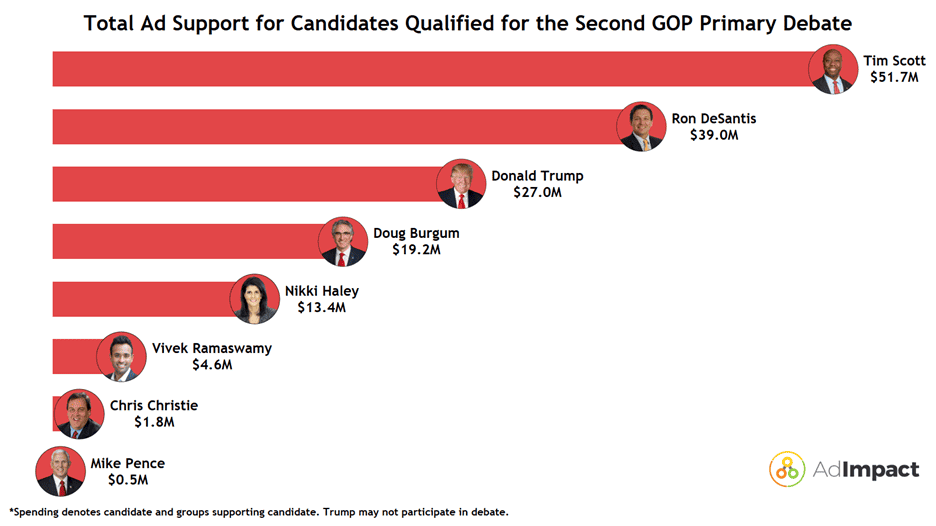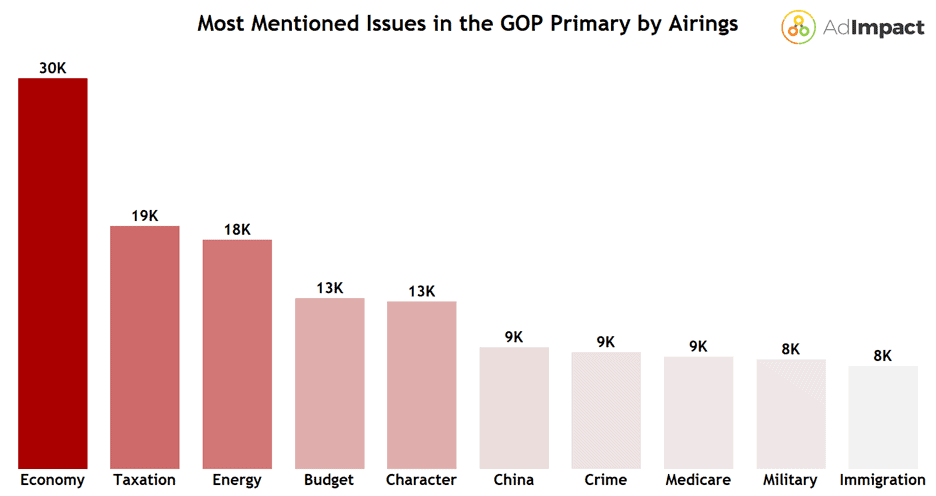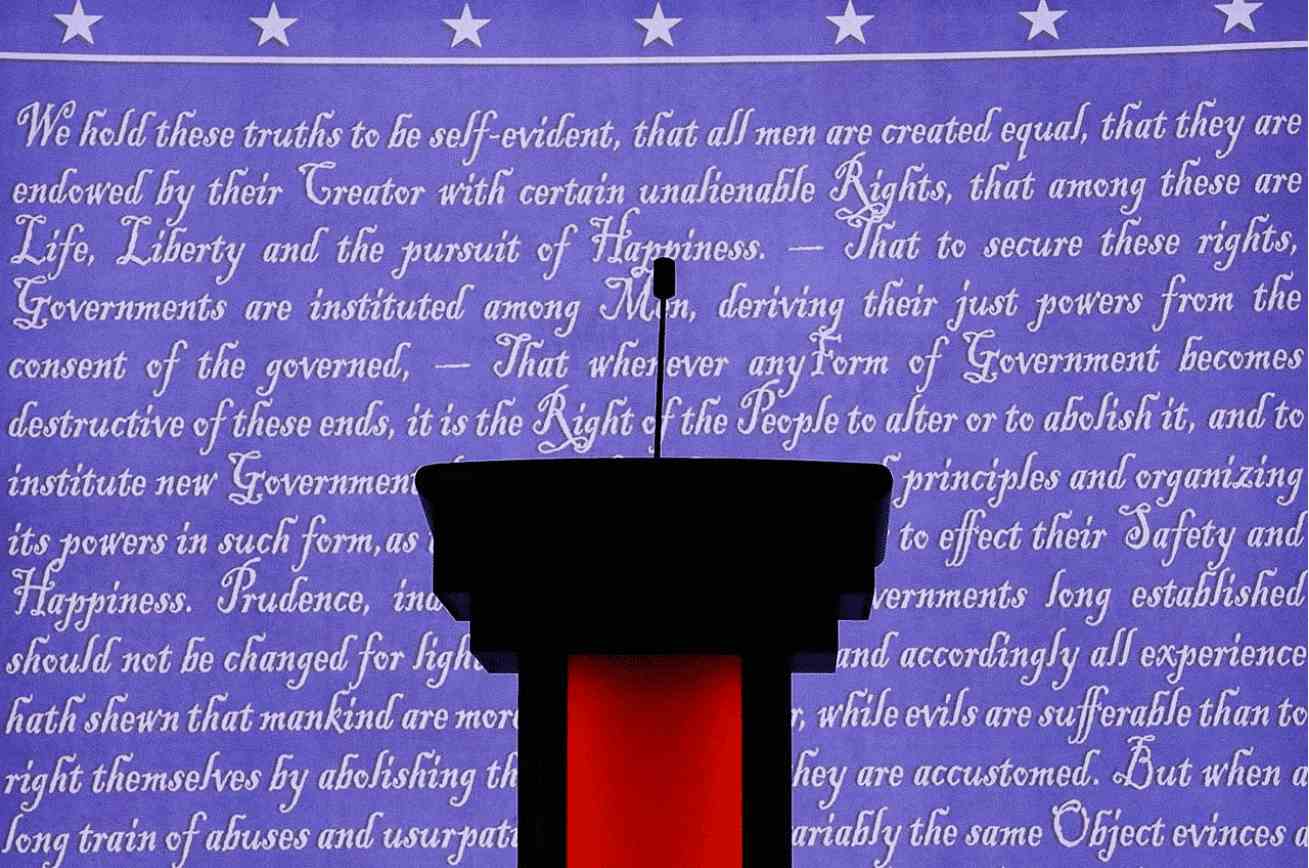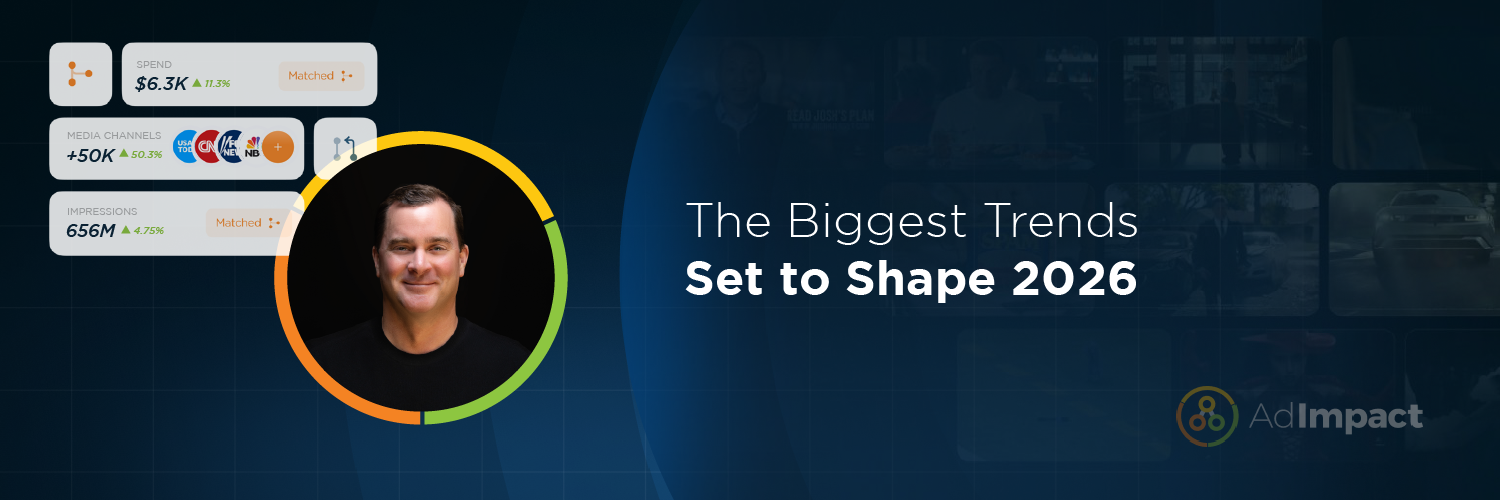Written by Ethan Mort
Tonight, seven Republican Presidential candidates will return to the stage for the second debate. This debate, hosted at the Ronald Reagan Presidential Library in Simi Valley, California, will air on Fox Business Network at 9PM ET. The Republican National Committee determined that seven candidates met the polling, donor, and pledge requirements: Ron DeSantis, Vivek Ramaswamy, Doug Burgum, Mike Pence, Nikki Haley, Tim Scott and Chris Christie. Asa Hutchinson was the only candidate who had qualified for the last debate that did not qualify for tonight’s debate. Despite meeting the donor and polling requirements, former President Donald Trump will instead head to Detroit to speak to autoworkers instead of participating in tonight's debate. It is unclear as to whether he signed the pledge to back the eventual winner of the GOP primary.
Overall, Republican advertisers have placed $177M in spending reservations. So far, $129M worth of ads have aired. This marks 72% more than Democratic advertisers spent in the 2020 Presidential primary before September 27, 2019. The early primary states of Iowa ($71M) and New Hampshire ($43M) have seen most of this year’s spending. Scott has seen the most ad spending and reservation support of any candidate with $51.7M. Since the first debate last month, the candidate with the highest increase in spending and reservation support was DeSantis with $20M added.

The economy is the most common issue mentioned in GOP primary TV advertising. Since the last debate, China has surged to become the seventh most mentioned issue. Alternatively, ads targeting LGBTQ rights have fallen out of the top ten. Ads supporting Trump and Burgum have focused on economic issues such as Medicare, Social Security, inflation, the national debt, and economic growth. Ads for DeSantis, Scott, and Ramaswamy have centered on social issues. Alternatively, ads supporting Christie and Pence have attacked Trump’s candidacy, while Haley’s PAC has released ads highlighting her tenure as the United States Ambassador to the United Nations.

Tim Scott
South Carolina Senator Tim Scott currently leads the field in total ad reservation support, with $51.7M. Following this week’s debate, pro-Scott advertisers already have $33M booked for the future. Trust in the Mission PAC has placed ad reservations through January 2024, making them the only Presidential advertiser to reserve 2024 airtime at this point. Scott has seen the most total ad support in the first three primary states, with $28M in Iowa, $18M in New Hampshire, $4M in his home state of South Carolina, and $1.5M on national cable. Many of Scott’s ads focus on his personal background and draw a contrast between his candidacy and Joe Biden's. Recently, ads supporting Scott focus on hot button issues such as illegal immigration and abortion.
Donald Trump
Former President Donald Trump currently leads GOP primary polls and has seen $27.1M total ad support, the second most of any GOP candidate. Trump’s support has largely come from MAGA Inc., who has spent $24M. Unlike other candidates, the vast majority of pro-Trump spending is on national cable, making up over 80% of his total ad support. Advertisers supporting Trump have mostly avoided highlighting social issues in their ads. Instead, they have focused on Social Security and Medicare, releasing over ten unique ads targeting those two issues. Nine of those ads attack Ron DeSantis, accusing him of wanting to cut Social Security and Medicare. MAGA Inc. also attacked DeSantis on his tax policies, labeling the governor as “Ron De-Salestax" in one ad. While DeSantis is the only Republican candidate that pro-Trump ads have targeted, they have already launched ads attacking President Joe Biden ahead of a potential November 2024 rematch. These ads have attacked the President on his handling of classified documents, his son Hunter Biden’s business dealings, his alleged witch hunt against Trump, his withdrawal from Afghanistan, immigration and inflation. Despite his lead in the polls, former President Trump has elected not to participate in tonight’s debate.
Ron DeSantis
Florida Governor Ron DeSantis has seen $39M in total ad support between his campaign and his PAC, Never Back Down. The two advertisers have targeted four early primary states, with $16M in Iowa, $9.7M across national broadcast and cable, $8.4M in New Hampshire, $3.7M in South Carolina, and $630K in Nevada. Pro-DeSantis advertisers lead the field in digital spending, with $2.5M spent across Facebook and Google. DeSantis’s early ads celebrated his roles in key social issues, highlighting his attacks on the media, corporations, and critical race theory. Recent Never Back Down ads have seemingly gone in a new direction, with two recent ads focusing on his personal background and military service, and another ad attacking Anthony Fauci. Another recent Never Back Down ad used footage from the first GOP Presidential primary debate of DeSantis talking about cartels operating around the Southern border.
Doug Burgum
North Dakota Governor Doug Burgum has seen $19.2M in total ad support from his campaign and his PAC, Best of America. Burgum is the only debate participant that has seen more national spending support ($9.2M) than spending targeting specific states (IA: $5.3M, NH: $4.7M). Burgum and his PAC have also spent $1M on radio ads, the most in support of any candidate. In his most aired ad, Burgum mentions his first priority as President would be to fix this “crazy economy”. His campaign ads mainly mention the economy, energy, and the military. Burgum has also directly attacked Biden, launching attack ads accusing the President of shutting down oil and gas production. The most recent Best of America ad uses clips of Burgum from the last debate. Pro-Burgum advertisers have spent $2M on digital advertisements. Burgum was the last candidate to qualify for tonight’s debate, announcing he qualified on 9/23.
Nikki Haley
Former South Carolina Governor and United States Ambassador to the United Nations Nikki Haley has seen $13.4M in total ad support from her campaign and her PAC, Stand for America (SFA). Pro-Haley advertisers have spent $7.6M in Iowa, $5.1M in New Hampshire, and $560K across national cable. Haley was the first candidate to officially announce her campaign but was one of the last candidates to see ads on traditional media, with her first TV ad airing on July 31st. Most ads supporting Haley focus on China and foreign policy, touting her experience as Ambassador to the United Nations. A recent SFA ad, and the only pro-Haley ad to not mention China, uses clips of Haley from the first debate and touts her stance on term limits and mental competency tests for politicians over 75.
Vivek Ramaswamy
Businessman Vivek Ramaswamy has seen $4.6M in total ad support from his campaign and his PAC, American Exceptionalism. Over a quarter of pro-Ramaswamy spending is on digital ads, with $1.6M spent. Pro-Ramaswamy advertisers have also spent $1.6M on ads in Iowa and $1.5M on ads in New Hampshire. This represents a dramatic shift of where things stood pre-first Debate where pro-Ramaswamy advertisers had only spent $466k in Iowa. Ramaswamy recently released two ads: one serving as an introduction to his position on a variety of social issues and the other supporting Trump in the face of his indictments. American Exceptionalism PAC’s first ad discusses Ramaswamy’s upbringing as a “son of immigrant parents seeking the American dream.” Since the debate, American Exceptionalism PAC has released two ads. Their first post-debate ad features clips of Ramaswamy giving his closing remarks from the debate, and their second post-debate ad touts Ramaswamy’s position of shutting down the FBI.
Chris Christie
Former New Jersey Governor Chris Christie has seen $1.8M in total ad support from his campaign and his PAC, Tell It Like It Is. Christie is the only debate-qualified candidate to not have any traditional ad support in Iowa. Instead, Christie’s campaign and Tell It Like It Is PAC have placed ad buys nationally ($300K) and in New Hampshire ($1.5M). Tell It Like It Is PAC has aired five ads on broadcast and cable, with all but one attacking Trump. One ad directly called out Trump for skipping the last debate. A few weeks ago, Tell It Like It Is received some notoriety for releasing the first political ad to feature Trump’s infamous Fulton County mugshot. The most recent Tell It Like It Is PAC ad begins with Christie recounting a Ronald Reagan quote and then moves to Christie touting his bipartisan achievements.
Mike Pence
Former Vice President Mike Pence has seen $500K in total ad support from his campaign and his PAC, Committed to America. The two advertisers have oriented their spending efforts primarily towards Iowa, which has seen 68% of their total spending. Pence is the only debate-qualified candidate to not have any traditional ad support in New Hampshire. Additionally, Pence is the only debate-qualified candidate to not have any broadcast spending support. Similar to Christie, pro-Pence advertisers have gone on the attack against Trump. One Committed to America PAC ad attacks Trump over the Jan 6th insurrection and another calls out Trump’s closeness with Vladimir Putin and Kim Jung Un. On digital, Pence has placed ads on Youtube to boost a 30 minute video of a speech he gave at St. Anselm College describing the contrast between conservatism and populism.
And Those Not Qualified for the Debate
The debate stage has shrunk from the last debate. Asa Hutchinson failed to meet the criteria to qualify for the debate. Pro-Hutchinson advertisers spent $118K, with half that spending being on digital. Hutchinson is not the only GOP candidate who failed to qualify. We’ve tracked $6.6M in ad spending supporting candidates who did not qualify for either of the first two debates (excluding Trump). Businessman Perry Johnson has seen the most ad support among these candidates, at $3.5M. Ryan Binkley ($2.3M), Will Hurd ($351K), and Larry Elder ($290K) have also seen significant ad support. Larry Elder has spent across more states than any other candidate in the GOP field, spending in AZ, CA, FL, IA, IL, MI, MN, NV, PA, and WI. The only major Republican candidate to have dropped out of the primary since the last debate was Francis Suarez, who saw $3.6M in total ad support. The Republican field will likely continue to narrow following the second debate.
For information about Republican issue groups spending against Donald Trump, check out our analysis here.





.png)



